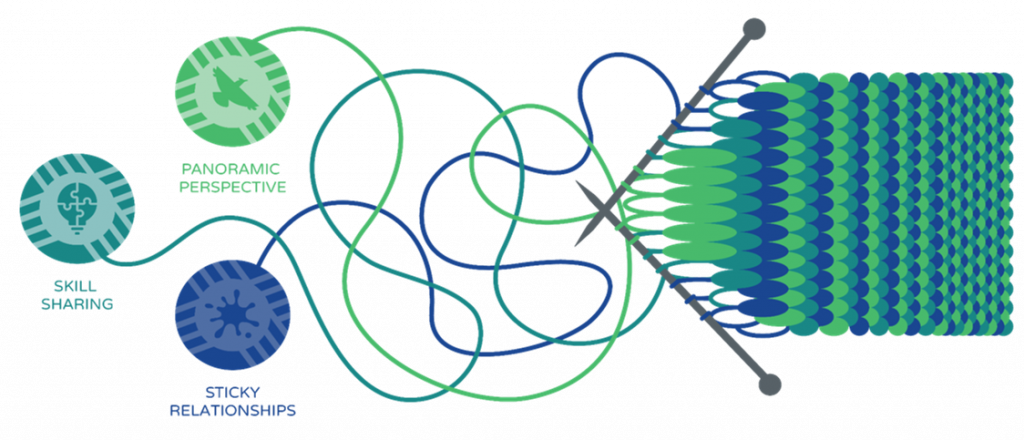
Common Impact has designed hundreds of meaningful skills-based volunteer partnerships over the years, and has watched them sustain far past the individual projects that initially bring business and nonprofit professionals together. Along the way, we’ve asked ourselves a few questions.
- What makes some skills-based engagements work better than others?
- When do we see partnerships move from transactional to transformational?
- How can we fully capture the knowledge and talents that exchange hands during successful skills-based partnerships?
What has emerged from nearly twenty years of practice is something Common Impact calls the “The Knitting Factor,” coined in our recent Stanford Social Innovation Review article, “The Promise of Skills-Based Volunteering. The Knitting Factor brings together three key conditions that enable skills-based engagements between the private and nonprofit sectors to create strengthened, sustainable solutions that don’t come undone when partners part ways.
- A Panoramic Perspective: Taking a bird’s eye view when crafting partnerships, by looking at people and organizations beyond their titles and sectors and allowing value to transcend profit.
- Skill Sharing: A focus on two-way talent exchange, where pro bono professionals and their companies are learning as much from the nonprofits they work with as those nonprofits learn from them.
- Sticky Relationships: A commitment to building long-lasting partnerships that drive missions and business forward.
While most companies and nonprofits easily understand the potential value of these sustainable cross-sector partnerships, embarking on them in practice can be challenging. This year, we’re going to demystify those partnerships, one dimension at a time, and provide you with the framework, tools and stories you need to knit skills-based volunteering into your everyday practice of building your organization – whether you’re at a large company or an entrepreneurial nonprofit.

Panoramic Perspective: Skills-based volunteerism is a powerful resource because its value is far greater than the sum of its parts. The skills, expertise and experiences it brings to the table directs net new resources towards solving complex social and business challenges. In order to truly tap into that potential, we must look beyond traditional sector roles, titles, and stereotypes and create real societal value – not just profit — and think openly and creatively about the value that each partner brings to the table.
I am fortunate to be able to write alongside the team of journalists at Nonprofit Quarterly (NPQ). While I’m not a journalist by trade, the editors liked the overarching sector perspective I had, and tapped into my enjoyment of writing to hone my voice as a news writer. Writing for NPQ has been my own personal commitment to pro bono for the nonprofit sector and has been incredibly expansive for me professionally. Through the research and writing, I’m able to gain a deep understanding of issues that I would otherwise only know in headlines and bring that back to my desk at Common Impact.

Skill Sharing: Within any successful and sustainable partnership, there needs to be an expectation of shared value, knowledge and learnings. Cross-sector partnerships need to start by squashing the notion that corporate professionals are the “experts” and nonprofits should be grateful for whatever they might receive. We need to recognize and articulate the unique value each partner brings in order to reap the full benefits of the array of skill sets, experiences, and backgrounds that might otherwise remain unnamed.
Center for Transforming Lives (CTL) embarked on a website development project with our partners at Fidelity Investments to build a more user-friendly platform. The result? Much more than just a brand new website. “[The Fidelity team] helped us understand their project methodology which made a seemingly challenging process more fun and doable for our team,” said Carol Klocek, CEO of CTL. We’ve now adopted this process from them, and have incorporated this methodology into our broader work.”
For Fidelity, the volunteers not only strengthened their existing skills, but learned new ways to approach their work. “At Fidelity, we’re focusing a lot of vitality and how we can become cutting-edge. The agile methodology we used on this project fits right in with allowing us to be productive and innovative,” said one of the volunteers.

Sticky Relationships: Finally, for skills-based volunteering to become truly transformative, organizations need to find the “sticky” relationships that enable companies and nonprofits to drive progress on both mission and business-related goals. How do you make this happen in practice? By grounding those partnerships in your people. Companies and nonprofits that nurture a culture of pro bono lay the foundation for deep personal and professional investment in an issue area, region or cause.
Common Impact’s partner, JPMorgan Chase is dedicated to developing long-term partnerships with their grantee organizations. One of their signature initiatives in New York is a commitment to expanding young people’s access to economic opportunity in the South Bronx by connecting technical and vocational schools to key employers in New York City. JPMorgan Chase not only supports these organizations with grants, but deepens their relationship and the effectiveness of those grants through skills-based volunteering engagements that provide strategic, targeted support.


